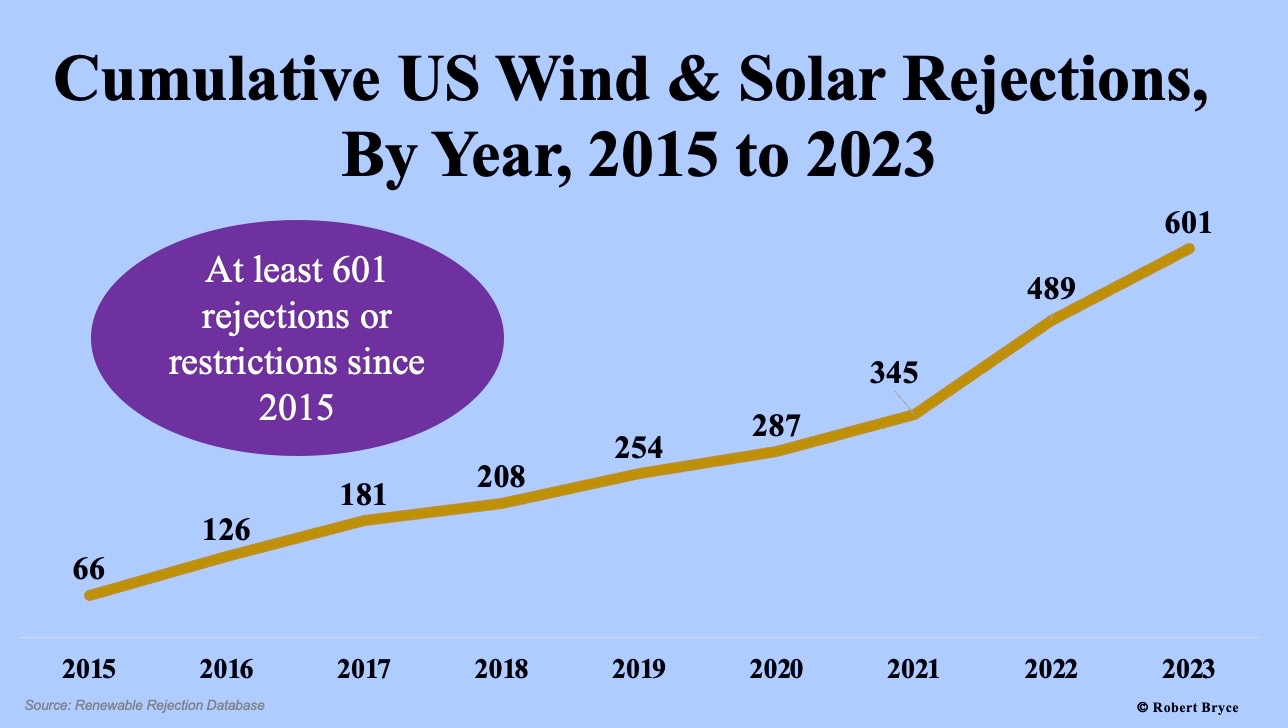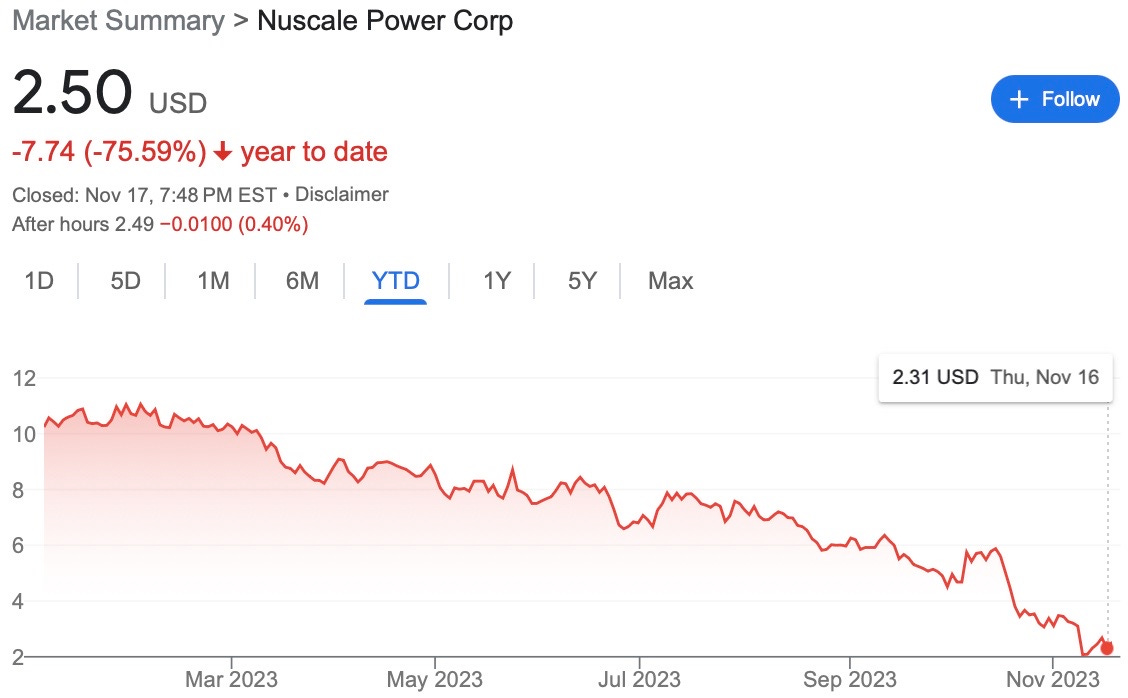Tally Of Wind/Solar Rejections Hits 601; X-energy Layoffs; Tony Abbott On The Podcast
Latest rejections in Kansas, Ohio, and Iowa illustrate ongoing backlash against Big Wind and Big Solar; SMR developer X-energy struggles; former Aussie prime minister talks geopolitics

Last week, the Mahoning County Commission, by a vote of 3-0, approved a resolution that bans big solar projects and large “economically significant wind farms” in unincorporated areas of Green Township, Ohio. According to a November 10 story by Ed Runyan, a reporter for The Vindicator, public input on the measure was “overwhelmingly” in support of the bans, and “over 800 signatures” of people favoring the ban were presented to the commissioners before the vote.
Four days after the vote in Ohio, county commissioners in Harvey County, Kansas, voted unanimously to ban commercial wind and utility-scale solar projects in their county. The votes in Ohio and Kansas bring the total number of restrictions or rejections of wind and solar in the U.S. to 601.
These rejections, which are cataloged in the Renewable Rejection Database, provide undeniable proof that all across rural America, landowners and policymakers are taking action to protect their neighborhoods from the landscape-destroying, viewshed-ruining, bird- and bat-killing sprawl that comes with Big Wind and Big Solar projects. Of course, you will not read about these rejections in the New York Times or on National Public Radio. The backlash, which is happening from Maine to Hawaii, doesn’t fit the narrative being peddled by academics at elite universities and climate activists who are hawking 100% renewable energy schemes. Nor does it fit the agenda of the big banks, big corporations, and big law firms that stand to make staggering sums of money from federal tax credits if more wind and solar projects get built.
But after more than a decade of reporting on the backlash against Big Wind and Big Solar, it’s clear to me that the level of resentment across rural America is rising. Rural landowners will not be bullied into going along with these massive infrastructure projects. Indeed, the trendline shows more and more rural communities are objecting. So far this year, there have been 49 rejections of wind energy and 63 solar rejections.
Last month, after the Board of Adjustment in Dickinson County, Iowa, denied a permit for the proposed Red Rock wind project being pushed by Chicago-based Invenergy, which is controlled by billionaire Michael Polsky, I got an email from Abigail Miles, a resident of Spirit Lake. Abigail told me that the Red Rock project, which was to have 79 turbines standing more than 500 feet high, was fiercely opposed by residents and that hearings on the project went on for “three very long nights.” She said the victory over Invenergy was “truly a testament to the people rising up against both a corrupt local government and a multi-billion dollar corporation and with enough resistance (and prayer) we were able to turn the tide. I'm honored to be a part of a community that fought so hard to protect their land.”
There are many reasons why the headlong rush to wind and solar energy is terrible policy. First among them: We should be building an electric grid that is weather resilient, not weather dependent. But the most obvious reason why the pursuit of wind and solar energy is a fool’s errand is that those forms of electricity generation require too much land. And no amount of spin will change that fact.
X-energy Layoffs
On Wednesday, the U.S. and U.K. governments announced their intent to triple installed nuclear power capacity globally by 2050. According to Bloomberg, the countries will issue a declaration on December 1 at the COP28 climate meeting in Dubai that will call on the World Bank and “other international financial institutions to include nuclear energy in their lending policies France, Sweden, Finland, and South Korea, are also expected to join the pledge. This is excellent news. So, too, was the recent statement by John Kerry, that “nuclear is 100% part of the solution.” The Biden administration’s climate envoy, added that “it’s clean energy.”
While those developments are welcome, the nuclear sector still faces growing pains. Proof of that came earlier this week when X Energy LLC, one of many companies hoping to commercialize small modular reactors, quietly laid off what was rumored to be about 100 employees. The layoffs came just days after NuScale Power, another SMR company, terminated its contract to build a small modular reactor in Idaho with the Utah Associated Municipal Power Systems.
The layoffs also came roughly two weeks after X-energy and Ares Acquisition Corp announced the termination of their proposed merger and initial public offering. The announcement noted challenging market conditions and “peer-company trading performance” an apparent reference to the collapse of NuScale’s stock price, which is down by about 76% since January 1. The release also noted a “balancing of benefits and drawback of becoming a publicly traded company under current circumstances.”
In an emailed statement about the layoffs, X-energy spokesman Robert McEntyre told me the company “recently restructured some of our internal operations to better align company activities with our near-term priorities and objectives, notably our initial deployment under the Advanced Reactor Demonstration Program with the Department of Energy and Dow. Some roles dedicated to supporting our plans to go public were transitioned as a result of our previously announced decision to remain private. McEntyre said the company would not disclose the total number of layoffs, but “the vast majority of our team is still in place.”
Asked when X-energy will submit its design for approval to the Nuclear Regulatory Commission, McEntyre said the company plans to do so “in the first quarter of next year.”
Tony Abbott, the former prime minister of Australia, on the Power Hungry Podcast
About two weeks, while at the Alliance for Responsible Citizenship conference in London, I had the pleasure of interviewing Tony Abbott. It was a fascinating discussion that covered a wide range of topics. Abbott lamented the “political cannibalism” in the U.S. and the disappointment in “governments throughout the Anglosphere.” Please give it a listen.
Please click that ♡ button, subscribe, and share.
Thanks.






Is there also a database showing the total number of approved projects over the same timeline? It would be good to compare. Regardless, we can only hope that what we are witnessing is the beginning of the collapse of the not so green transition to unreliables. From EVs to cancelled off-shore wind projects along with what is now happening in rural US. Our enemies are ROFL at the lunacy of western woke "leaders" as they race to outdo each other in destroying their economies with this nonsense. IMO, the existential threat we face is the full implementation of the Inflation Acceleration Act and legislation in other western democracies looking to eliminate the use of fossil fuels. Our enemies are simply bidding their time until we so weaken ourselves to be effectively defenseless when they decide to take some decisive action.
As a chemist, my perspective is that there are strictly no such things as "sustainables" or "renewables" energy wise; but rather only changes in efficiency of man-made processes in our physical reality.
This is consistent with The Law's of Physics and Thermodynamics.
The only real "sustainable" is life on the planet earth in equilibrium with it's natural processes, all driven by the sun, without human intervention.